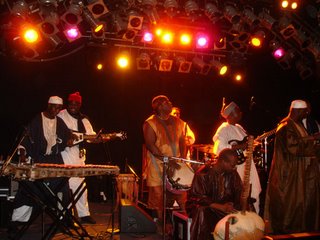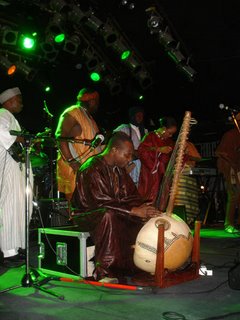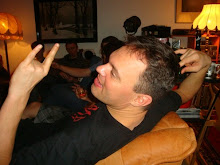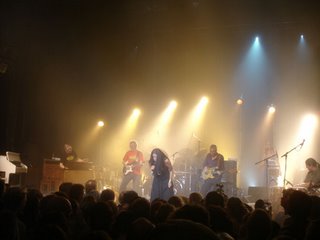
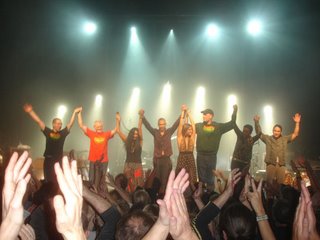
The Savage Rose. Vega, Copenhagen 26/11/06
The first time I heard The Savage Rose was in the mid 80's. It was a song called Det er tid nu, from the through and through political album Vi kaemper for at sejre. I have rarely reacted to a single song like I did that time. Not only was it a great song. It was performed with such intensity. Even if you disregard the lyrics the message was made so obvious through the music. But most of all through the vocals. The song was performed by the most outstanding voice I had heard up to that time and it has yet to be matched. I bought the record and I bought some more records. Savage Rose became one of my favourite bands at a time when political music were totally out of fashion in Sweden. They have remained favourites ever since and - they have continued to deliver great recordings, even though new releases have been increasingly infrequent. During all this time they have never made me disappointed, in fact there are very few bands or artists with such quality assurance in the world today.
Savage Rose has had a lot of members through the years (they started way back in 1967!), but has always been centred around the song writer and keyboard/accordion player Thomas Koppel and the singer Annisette (born Hansen, later Koppel as she and Thomas got married). Thomas was a true genius, not only writing great pop songs through four decades but also classical music and other stuff. His death in February, 2006, at the age of 61, was nothing short of a tragedy. I usually don't grieve the loss of famous people - they are "only" humans - but this was one such time. Annisette is, according to me, undoubtedly the greatest female pop/rock-singer of this planet. Not only does she have a phenomenally strong voice, she also sings like she means everything the songs stand for. One can hear elements from legendary singers like Janis Joplin, Billie Holiday and Aretha Franklin but above all it's just Annisette, as close to a singing goddess it is possible. The combination of Thomas and Annisette is unique and has made The Savage Rose one of Scandinavia's most important acts - for me, in fact, THE most important act.
The first time I heard The Savage Rose was in the mid 80's. It was a song called Det er tid nu, from the through and through political album Vi kaemper for at sejre. I have rarely reacted to a single song like I did that time. Not only was it a great song. It was performed with such intensity. Even if you disregard the lyrics the message was made so obvious through the music. But most of all through the vocals. The song was performed by the most outstanding voice I had heard up to that time and it has yet to be matched. I bought the record and I bought some more records. Savage Rose became one of my favourite bands at a time when political music were totally out of fashion in Sweden. They have remained favourites ever since and - they have continued to deliver great recordings, even though new releases have been increasingly infrequent. During all this time they have never made me disappointed, in fact there are very few bands or artists with such quality assurance in the world today.
Savage Rose has had a lot of members through the years (they started way back in 1967!), but has always been centred around the song writer and keyboard/accordion player Thomas Koppel and the singer Annisette (born Hansen, later Koppel as she and Thomas got married). Thomas was a true genius, not only writing great pop songs through four decades but also classical music and other stuff. His death in February, 2006, at the age of 61, was nothing short of a tragedy. I usually don't grieve the loss of famous people - they are "only" humans - but this was one such time. Annisette is, according to me, undoubtedly the greatest female pop/rock-singer of this planet. Not only does she have a phenomenally strong voice, she also sings like she means everything the songs stand for. One can hear elements from legendary singers like Janis Joplin, Billie Holiday and Aretha Franklin but above all it's just Annisette, as close to a singing goddess it is possible. The combination of Thomas and Annisette is unique and has made The Savage Rose one of Scandinavia's most important acts - for me, in fact, THE most important act.
Following the death of Thomas Koppel, Annisette decided the show must go on. A tour was planned for the autumn of 2006 and yesterday was the final show of the tour, at Vega in Copenhagen.
First question: How would the new keyboard player, Palle Hjort, cope with "replacing" Thomas Koppel? Palle did the only right thing, he didn't try. He went in and played in his way. He didn't try to copy anyone. He played mostly organ, compared to Thomas who played a lot more accordion. And what an organ player! It takes a lot of courage to take the place of a legend, but they couldn't have found anyone better.
Second question: How is Annisette's voice? After all she is now 58 years old. The answer is that she has never sounded better. This woman is absolutely unique. For more than two hours she (together with the great, great band) kept me in a state I never or very rarely has experienced before and yet I have been to several hundreds of concerts through the years.
The set list was great. Wild Child, Black Angel, Dear Little Mother, Your Daily Gift (outstanding version with only keyboards and vocals!) and also a couple of new songs. Maybe, if anything, I had hoped for some more tunes in Danish (a great language for pop/rock-music, highly underrated!) from the political period but we got a great version of I kan ikke sla os ihjel as an encore together with a heartbreaking version of Smile, this one also with only keyboards and vocals. What could be expected to be a sad evening due to the tragic death of Thomas ended in the completely opposite way. Everyone was smiling while walking out of the arena. Not only due to the fantastic playing and singing by the all through great band (yes, Annisette is of course the star but this is very much a band where everyone is performing), but also due to the big emotions surrounding this concert. The fact that they turned the death of Thomas Koppel into something this great makes me consider this as one of my best concert nights ever. This band has not only a great past, they also have a great future! Rating: +++++, without a shadow of a doubt!
The Savage Rose in 2006 is (from left to right in the third picture above): Palle Hjort (keyboards), Peer Frost (guitar), Annisette (vocals), Moussa Diallo (bass), Naja Koppel (backing vocals), Klaus Menzer (drums), Aisha Thorsen (backing vocals) and Raul Rekow (percussion).















